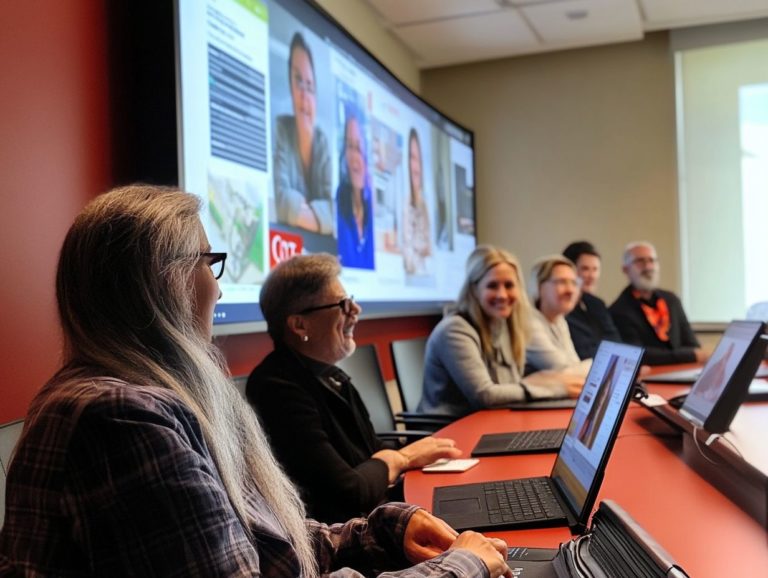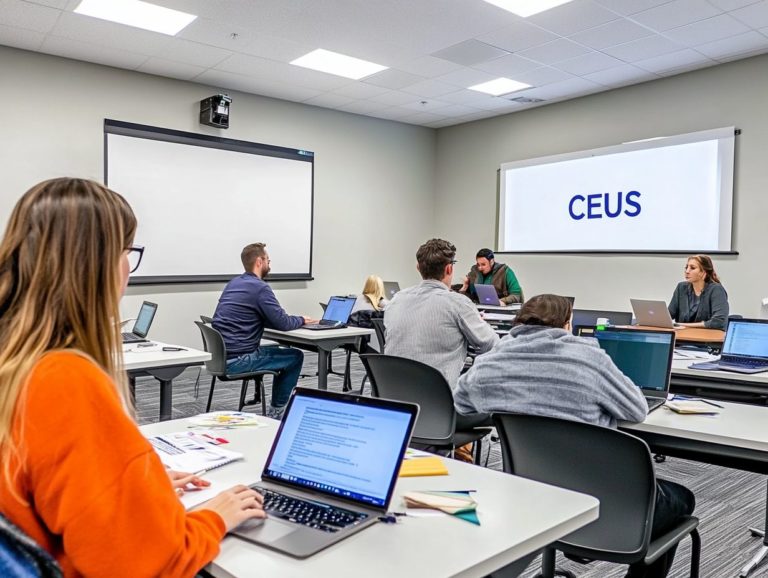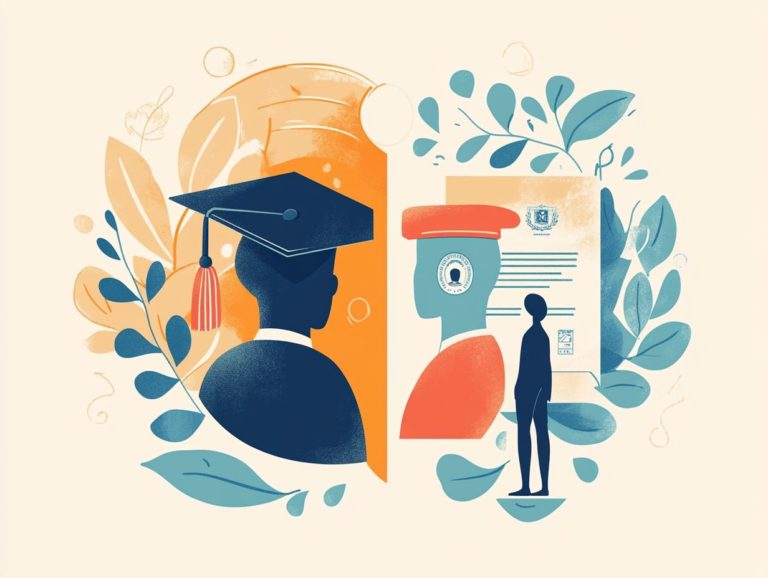5 Essential Educational Certifications for Adult Learners
Navigating the world of education as an adult learner is an exciting journey. Whether you want to sharpen your skills or change your career path, obtaining the right certifications can make a significant difference.
Explore five essential educational certifications that could change your life: the High School Equivalency Certificate, Associate’s Degree, Bachelor’s Degree, Master’s Degree, and various Professional Certifications. Each credential offers unique benefits and opportunities that can elevate your career.
Here, you ll find a breakdown of the requirements, costs, and long-term advantages associated with each certification. Alongside, you ll discover practical tips for balancing work and study. See how these achievements can transform your future!
Contents
- Key Takeaways:
- 1. High School Equivalency Certificate
- 2. Associate’s Degree
- 3. Bachelor’s Degree
- 4. Master’s Degree
- 5. Professional Certifications
- What Are the Benefits of Obtaining These Certifications as an Adult Learner?
- What Are the Different Types of High School Equivalency Certificates?
- What Are the Requirements for Obtaining an Associate’s Degree?
- How Can a Bachelor’s Degree Help Advance a Career?
- What Are the Different Types of Master’s Degrees Available?
- What Are Some Popular Professional Certifications for Adult Learners?
- How Can These Certifications Help with Career Advancement?
- What Are the Different Methods of Obtaining These Certifications?
- What Are the Costs Associated with Obtaining These Certifications?
- How Can Adult Learners Balance Work and Education While Obtaining These Certifications?
- What Are the Long-Term Benefits of Obtaining These Certifications?
- Frequently Asked Questions
- 1. What are the 5 essential educational certifications for adult learners?
- 2. Are these certifications necessary for all adult learners?
- 3. What is the purpose of obtaining these certifications?
- 4. Can adult learners pursue these certifications online?
- 5. How long does it take to complete these certifications?
- 6. Are there any financial assistance options available for adult learners pursuing these certifications?
Key Takeaways:

- A High School Equivalency Certificate opens doors to new job opportunities and gives you a sense of achievement!
- An Associate’s Degree provides specialized knowledge and skills in a specific field.
- Earn a Bachelor’s Degree to greatly enhance your career prospects and increase your earning potential.
1. High School Equivalency Certificate
The High School Equivalency Certificate is your key to unlocking new opportunities. It validates your foundational learning and opens pathways for further education and professional growth.
This certification showcases your commitment to education and equips you with essential learning strategies needed in today’s job market. Additionally, exploring niche educational certifications can further enhance your qualifications. You will typically need to pass several subject tests in areas like math, reading comprehension, and writing.
Meeting these requirements can boost your confidence and motivation. Obtaining this certificate can align your skills with your career aspirations and enhance your success across various professional fields.
2. Associate’s Degree
An Associate’s Degree is a valuable credential for adult learners. It lays a solid foundation in key subjects while paving the way for further academic and professional aspirations.
This degree provides fundamental knowledge and hones your critical thinking and technical skills qualities highly sought after in today s job market.
You can choose from a range of programs in fields like healthcare, information technology, and business that align with your career goals. Many institutions use assessment tools to monitor your progress and ensure mastery of essential areas.
This degree fits well into your overall learning plan, helping you stand out and seize enhanced career opportunities.
3. Bachelor’s Degree
A Bachelor’s Degree not only enriches your knowledge and skills but also improves your career prospects. It gives employers a clear idea of your competencies that match industry standards.
This educational milestone helps you develop critical thinking, effective communication, and problem-solving abilities essential skills in today s dynamic workplace.
By embracing hands-on learning and collaborative projects, you can contribute to a culture of continuous improvement in your organization, leading to innovative solutions.
Adult education frameworks support you in balancing your professional responsibilities while pursuing your degree, creating a win-win for both you and your employer.
4. Master’s Degree
A Master’s Degree represents top academic success. It provides valuable advanced skills that are crucial in today s job market.
This education gives you tools to excel in your field. It also boosts your professional credibility and expands your networking opportunities.
Different types of Master’s Degrees, such as an MBA (Master of Business Administration), M.Ed (Master of Education), or M.S.W. (Master of Social Work), cater to various expertise areas.
When choosing a program, consider your career goals. Ensure the curriculum aligns with industry trends and offers practical applications for growth.
Engage with faculty and peers during your studies. This interaction helps transform theoretical knowledge into real-world skills.
5. Professional Certifications
Professional certifications validate your skills and knowledge. They provide a structured path for continuous learning and excellence in your field.
Options like the Certified Professional in Talent Development and Agile Certification cater to adult learners. These enhance your competence and align with organizational goals while also providing essential skills gained from educational certifications.
Check for prerequisites before pursuing certifications. Relevant work experience or educational qualifications may be needed.
Investing in your professional development through these programs elevates your career prospects. It helps you contribute effectively to your organization.
What Are the Benefits of Obtaining These Certifications as an Adult Learner?

Obtaining certifications as an adult learner opens up numerous benefits. Consider exploring unique educational certifications to enjoy enhanced career opportunities, higher earning potential, and in-demand skills that meet industry needs.
These credentials showcase your commitment. They also positively affect how employers view your qualifications.
Ongoing education strengthens your competitive edge. Connect with industry peers for valuable networking opportunities.
Participate in workshops and collaborative projects. They broaden your knowledge base and help build relationships for career advancement.
This continuous learning is vital for talent management. Stay adaptable and relevant in today s job landscape.
What Are the Different Types of High School Equivalency Certificates?
High School Equivalency Certificates include the GED, HiSET, and TASC. Each one validates your educational competencies as an adult learner.
These certificates help enhance your qualifications and begin vocational training. The GED is widely recognized and accepted by many colleges.
The HiSET offers similar opportunities and may be favored in some states. The TASC provides an alternative testing format.
Each certification has a distinct set of tests, so select the one that aligns with your needs. Securing any of these can broaden your educational horizons and improve your career prospects.
What Are the Requirements for Obtaining an Associate’s Degree?
The journey to obtaining an Associate’s Degree generally involves completing a series of core courses and electives while maintaining a minimum GPA. This combination equips you with the essential knowledge and skills necessary for your future endeavors.
Beyond just academic performance, you often need to showcase your competency in various skill areas. This might include hands-on training or practical assessments. Adhering to specific attendance policies and meeting deadlines for projects and assignments are crucial steps in ensuring a successful educational experience.
Effective training and assessment aren’t merely beneficial; they are vital for achieving your academic objectives. They reinforce the curriculum and prepare you for real-world applications.
By focusing on these requirements, educational programs enable you not only to graduate but also to excel in your chosen field.
How Can a Bachelor’s Degree Help Advance a Career?
A Bachelor’s Degree is a significant asset for your career advancement. It equips you with critical skills and knowledge that employers highly value. This often leads to higher positions and increased responsibilities within organizations.
This educational achievement enhances essential skills such as analytical thinking and effective communication. It also provides you with a comprehensive understanding of industry-specific practices.
In dynamic fields like technology and healthcare, your degree can serve as a crucial stepping stone. It opens doors to specialized roles that demand a proven level of expertise. It fits well with ongoing learning and development, helping you grow and adapt in a changing job market.
By pursuing this qualification, you ll find yourself better prepared to tackle challenges, foster innovation, and contribute meaningfully to your industry. With your degree in hand, you ll be ready to embrace new challenges and reshape your future!
What Are the Different Types of Master’s Degrees Available?
You ll find a remarkable array of Master’s Degrees available, spanning fields like business administration, education, engineering, and health care. Each degree is crafted to align with your career ambitions as an adult learner.
These advanced degrees not only sharpen your current skills but also introduce innovative concepts essential for navigating today s fast-paced job market. For example, a Master’s in Business Administration zeroes in on leadership and strategic management, enabling you to tackle complex organizational challenges head-on.
In the realm of education, degrees emphasize teaching methods and strategies, equipping you to inspire and engage learners effectively. Engineering programs explore groundbreaking technologies, while health care degrees confront critical issues in patient care and management.
Ultimately, pursuing a Master’s Degree is a commitment to continuous learning. It elevates your career trajectory and enhances your professional competencies.
What Are Some Popular Professional Certifications for Adult Learners?
Popular professional certifications for adult learners include:
- Certified Professional in Talent Development
- Project Management Professional
- Agile Certification (a certification that helps teams work better together and adapt quickly to change)
Each certification is meticulously designed to enhance your skills and validate your expertise in the key areas that today s industries demand. These certifications cater to many professionals, whether you are a seasoned manager looking to elevate your strategic capabilities or a newcomer eager to make your mark in a competitive job market.
By pursuing these qualifications, you not only boost your employability but also align your skill set with the ever-evolving industry standards. Don’t wait! Start pursuing these qualifications now to keep up with industry demands.
For instance, the Certified Professional in Talent Development emphasizes enhancing training effectiveness and workforce development. The Agile Certification provides you with essential frameworks that promote adaptability in dynamic work environments.
Such tailored qualifications are pivotal in effective talent management, ensuring that organizations have the right skills to thrive and innovate.
How Can These Certifications Help with Career Advancement?

Certifications are crucial for your career advancement. They provide recognized credentials that validate your skills. This makes you more appealing to employers. It also opens doors to new job opportunities.
By pursuing specialized certifications, you re not just enhancing your skill set; you re showcasing your dedication to continuous learning and professional growth. This active approach can significantly impact your chances for promotions and salary increases, as organizations tend to view certified professionals as more capable and motivated.
Acquiring these credentials can also pave the way for you to explore new career paths. You can transition into fields where your newly acquired skills are in high demand. Committing to education opens up exciting new paths and keeps you adaptable in a fast-changing job market.
What Are the Different Methods of Obtaining These Certifications?
You have various methods for obtaining certifications, including online courses, workshops, and traditional classroom training. Each option offers unique opportunities to expand your knowledge and skills at your own pace.
These choices cater to different learning preferences and lifestyles. This allows you to select the path that best fits your circumstances. For instance, online courses provide the convenience of studying from anywhere, making it easier to balance family or work commitments.
However, they may lack the interactive elements found in workshops and classrooms, which can enhance comprehension and networking. Traditional classrooms offer structured environments and real-time discussions, but they can be less adaptable to unpredictable schedules.
By understanding these trade-offs, you can choose the most suitable certification route for your professional and personal growth.
What Are the Costs Associated with Obtaining These Certifications?
The costs associated with obtaining certifications can vary dramatically based on the program or institution. It’s essential to plan your finances carefully. This helps you invest in your education without financial stress.
Typically, tuition fees for certification programs range from a few hundred to several thousand dollars, depending on the field and the provider. You should also consider extra costs, such as textbooks, course materials, and exam fees, which can easily add hundreds more to your budget.
To ease these financial pressures, explore various financial aid opportunities, including grants, scholarships, and low-interest loans. Developing a sound budgeting strategy is essential. By crafting a detailed financial plan that accounts for tuition, materials, living expenses, and potential income loss during your studies, you can approach your certification pursuits with confidence and significantly less stress.
How Can Adult Learners Balance Work and Education While Obtaining These Certifications?
Balancing work and education can feel like a tightrope walk for adult learners. However, with effective time management, flexible learning options, and supportive employer policies, you can master this balance while pursuing educational certifications.
To navigate this intricate landscape, employing strategies like prioritization can be invaluable. Start by identifying your most pressing tasks and allocate time accordingly. This ensures that your educational commitments fit seamlessly into your daily schedule.
Utilizing online learning tools provides unparalleled flexibility, allowing you to study at your own pace. This adaptability can truly be a game changer as you juggle multiple responsibilities.
The role of supportive employers is crucial in fostering a conducive learning environment. By offering resources and encouragement, they enhance your learning experience and cultivate a culture of continuous improvement.
What Are the Long-Term Benefits of Obtaining These Certifications?
Certifications offer long-term benefits that extend beyond just career advancements. They promote ongoing learning, skill enhancement, and a strong professional network, all of which are vital for sustaining your career growth.
As you earn each new certification, you re likely to experience a significant boost in job satisfaction. You ll feel more competent and confident in your role, and this increased confidence plays a crucial role in enhancing your job security. You ll gain relevant skills that keep up with ever-evolving industry standards.
Pursuing certifications opens doors to invaluable networking opportunities, connecting you with like-minded peers and industry leaders. This supportive network fosters knowledge sharing and paves the way for mentorship and collaborative projects, enriching your overall career experience.
Frequently Asked Questions
1. What are the 5 essential educational certifications for adult learners?

Wondering what certifications you need? Here are the 5 essentials: GED, Associate’s degree, Bachelor’s degree, Master’s degree, and field-specific professional certifications.
2. Are these certifications necessary for all adult learners?
No, these certifications are not necessary for all adult learners. However, the importance and relevance of top online educational certifications for 2024 can vary based on an individual’s career goals and educational needs.
3. What is the purpose of obtaining these certifications?
The purpose of obtaining these certifications is to gain knowledge, skills, and credentials that can help adult learners advance in their careers, increase job opportunities, and boost earning potential, as highlighted in the 5 top educational certifications for online instructors.
4. Can adult learners pursue these certifications online?
Yes, adult learners can pursue these innovative educational certifications online through accredited institutions and organizations. Online learning offers flexibility and convenience for those balancing work and family obligations.
5. How long does it take to complete these certifications?
The duration of these certifications varies depending on the program and the individual’s pace of learning. Some certifications can be completed in a matter of months, while others may take several years.
6. Are there any financial assistance options available for adult learners pursuing these certifications?
Yes, there are various financial assistance options available, such as scholarships, grants, and loans, for adult learners pursuing these certifications. It is essential to research and apply for these opportunities to help cover the costs of education.
Ready to take the next step in your career? Start your certification journey today!






